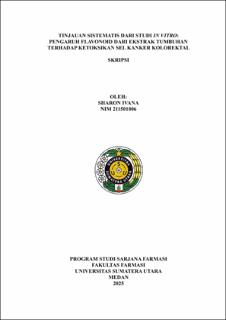| dc.description.abstract | Background: Colorectal cancer remains one of the leading causes of cancer-related
mortality worldwide, with incidence rates steadily increasing annually.
Conventional treatment methods show limited effectiveness due to adverse side
effects. Flavonoids, as natural compounds, have emerged as potential alternative
therapies for colorectal cancer treatment due to their safety profile and cytotoxic
effects on cancer cells.
Objective: This systematic review aims to compare the effects of flavonoids from
various plant extracts on colorectal cancer cytotoxicity through in vitro studies.
Method: This non-experimental descriptive study employed the PRISMA
(Preferred Reporting Items for Systematic Reviews and Meta-Analyses) 2020
methodology, which includes research question identification, literature eligibility
criteria establishment, literature search sources determination, search strategy
development, relevant literature selection, data extraction, data items determination,
literature bias risk assessment, results presentation, and PROSPERO (International
Prospective Register of Systematic Reviews) registration.
Results: This systematic review analyzes the effects of flavonoids from plant
extracts on colorectal cancer based on in vitro studies. A total of 16 studies that met
the eligibility criteria were analyzed. The results indicate that most extracts
exhibited cytotoxic effects to varying degrees, although two studies did not find
significant effects based on the ISO 10993-5 cell viability standard and the
cytotoxicity criteria of the U.S. National Cancer Institute (NCI). A correlation was
observed between the type of cancer cell line, duration of exposure, and the level
of cytotoxicity. The toxicity of flavonoids depends on several factors, including the
plant species, the part of the plant used, and the characteristics of the cell culture
used.
Conclusion: Plant-derived flavonoids demonstrate cytotoxic activity against
colorectal cancer cells. | en_US |


